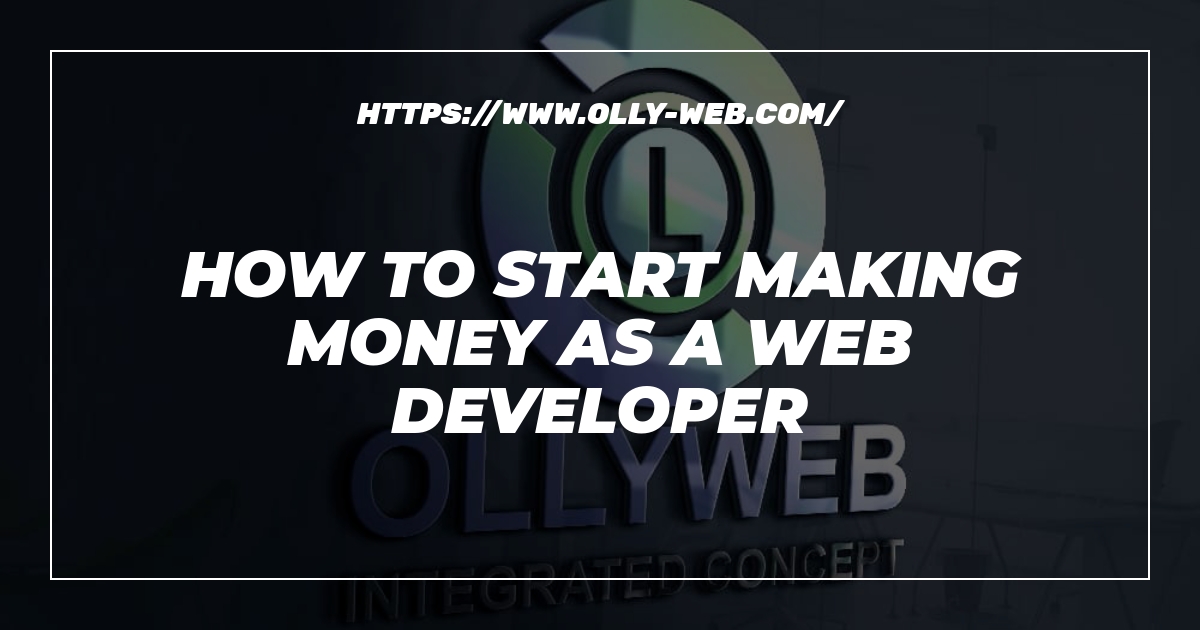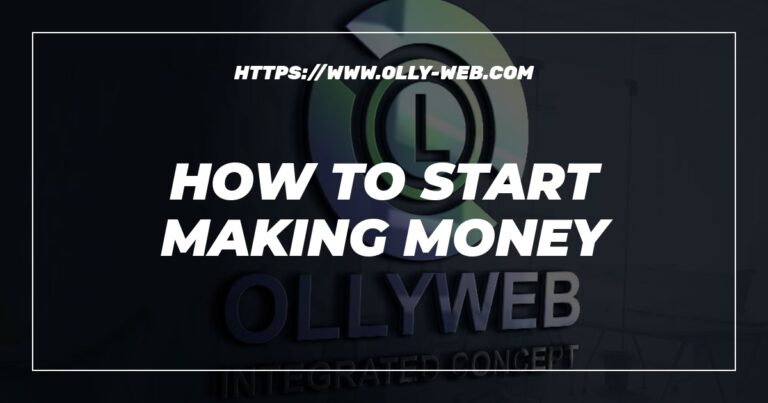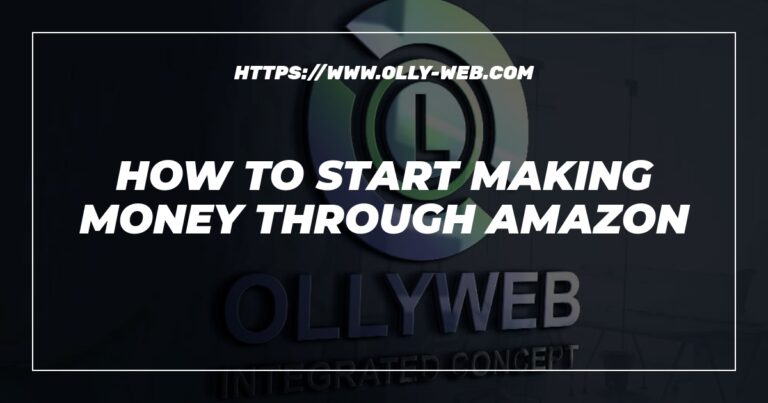How To Start Making Money As A Web Developer

Hey there, fellow hustlers! So, you've got a knack for coding and a passion for all things web-related? Well, my friend, you're in luck because today we're diving headfirst into the exciting world of web development and how you can start raking in the dough doing what you love. Yep, you heard me right – we're talking about making some serious moolah as a web developer! Now, I know what you're thinking – “How the heck do I even get started?” Don't you worry, my friend, because I've got your back. In this article, we're going to break it down for you, step by step, and show you exactly how to kickstart your journey towards financial success in the web development industry. So, grab your favorite coding tool, buckle up, and get ready to embark on this money-making adventure!
Skills needed to become a web developer
So you wanna be a web developer, huh? Well, let me tell you, it's not all about sitting in front of a computer and typing away. Sure, that's a big part of it, but there's so much more to it than that. To become a web developer, you need a whole arsenal of skills in your toolkit. Let's break it down, shall we?
First and foremost, you gotta have a solid understanding of programming languages. HTML, CSS, and JavaScript are the holy trinity of web development. HTML is like the skeleton of a website, CSS is the skin that makes it look pretty, and JavaScript is the brain that makes it all come alive. You gotta know these languages like the back of your hand, my friend. And don't forget about frameworks like React or Angular, they can make your life a whole lot easier.
But it's not just about coding, my friend. You also need to have an eye for design. A good web developer knows how to make a website not only functional but also visually appealing. You gotta know your way around Photoshop or Sketch, and have a good understanding of color theory and typography. Trust me, a well-designed website can make all the difference.
And last but not least, you gotta be a problem solver. Web development is all about finding solutions to complex problems. You'll encounter bugs, compatibility issues, and all sorts of technical challenges along the way. But hey, that's what makes it exciting, right? So embrace your inner detective and get ready to dive deep into the world of debugging and troubleshooting.
So there you have it, my friend. The skills you need to become a web developer. It's a challenging but rewarding field, and if you're willing to put in the time and effort, you can create some truly amazing things. So grab your laptop, fire up your favorite code editor, and get ready to embark on this wild web development journey. Good luck!
Different types of web development
So, let's talk about the different types of web development, my friend. Now, when it comes to building websites, there's a whole bunch of ways you can go about it. It's like having a toolbox full of different tools, each with its own purpose and specialty. So, buckle up and let's dive into this web development world!
First up, we have front-end development. This is all about the stuff you see and interact with on a website. It's like the face of the website, you know? Front-end developers use languages like HTML, CSS, and JavaScript to create the layout, design, and functionality of a website. They make sure everything looks good, works smoothly, and is user-friendly. It's like being the architect and interior designer of a digital space.
Next, we have back-end development. This is where the magic happens behind the scenes. Back-end developers work on the server-side of things, handling the logic and data that make a website function. They use languages like Python, Ruby, or PHP to build the server, set up databases, and handle all the complex stuff that makes a website work smoothly. It's like being the brain of the operation, making sure everything runs smoothly and efficiently.
And finally, we have full-stack development. This is like being a jack-of-all-trades in the web development world. Full-stack developers are skilled in both front-end and back-end development. They can handle everything from designing the user interface to building the server and handling the database. It's like being the ultimate web development superhero, able to tackle any challenge that comes their way. So, if you're looking to be a web development ninja, full-stack is the way to go!
So, there you have it, my friend. The different types of web development in a nutshell. Whether you're into creating beautiful user interfaces, handling complex server-side logic, or being a master of both worlds, there's a path for you in the exciting world of web development. So, grab your coding tools and get ready to build some amazing websites!
Choosing a niche in web development
So, you're thinking about diving into the world of web development, huh? Well, let me tell you, it's a wild ride, my friend. But before you strap yourself in, you gotta figure out which niche you want to specialize in. Trust me, it's like choosing your favorite flavor of ice cream – there are so many options, and each one has its own unique taste.
First up, we've got front-end development. This is all about creating the user interface and making sure everything looks pretty. It's like being the interior designer of the web world. You'll be working with HTML, CSS, and JavaScript to bring websites to life. If you've got an eye for design and love making things look good, this might be the niche for you.
Next, we've got back-end development. This is where the magic happens behind the scenes. You'll be working with databases, servers, and all that technical stuff. It's like being the architect of the web world. If you're more into problem-solving and making things work seamlessly, this niche might be your cup of tea.
Lastly, we've got full-stack development. This is the best of both worlds, my friend. You'll be working on both the front-end and back-end, making you a jack of all trades. It's like being the master chef of the web world – you can whip up a delicious website from scratch. If you're up for the challenge and want to have a wide range of skills, full-stack development might be the niche for you.
So, there you have it – three different niches in web development. Take some time to think about what excites you the most and what aligns with your skills and interests. Remember, there's no right or wrong choice here. It's all about finding your passion and diving headfirst into it. Good luck, my friend, and happy coding!
Creating a portfolio as a web developer
So, you want to create a portfolio as a web developer, huh? Well, let me tell you, having a killer portfolio is like having a golden ticket to the chocolate factory of job opportunities. It's your chance to showcase your skills, creativity, and passion for web development. But hey, don't worry, I got your back. I'm gonna break it down for you and give you some tips on how to make your portfolio stand out from the crowd.
First things first, you gotta think about the design of your portfolio. Remember, you're a web developer, so your portfolio should reflect your expertise in this field. Don't go for a generic template that looks like it was made in the early 2000s. Nah, you gotta go for something sleek, modern, and eye-catching. Use bold colors, clean lines, and intuitive navigation to make your portfolio a joy to explore. And don't forget to make it responsive, so it looks good on any device. Trust me, a well-designed portfolio will make a lasting impression on potential employers.
Now, let's talk about the content of your portfolio. This is where you can really show off your skills and projects. Start by including a brief introduction about yourself and your passion for web development. Then, showcase your best work. Pick a variety of projects that demonstrate your versatility and expertise. Use screenshots, videos, or even live demos to give employers a taste of what you can do. And don't forget to include a description of each project, highlighting the technologies you used and the challenges you faced. Oh, and if you've worked on any real-world projects or collaborated with others, make sure to mention that too. It shows that you can work well in a team and handle real-life challenges.
Last but not least, make sure your portfolio is easy to navigate and user-friendly. Ain't nobody got time to figure out how to navigate a confusing website. Keep it simple and intuitive. Use clear headings, a logical structure, and a search function if you have a lot of projects. And hey, don't forget to include your contact information, so potential employers can easily get in touch with you. Oh, and one more thing, keep your portfolio up to date. Add new projects, remove outdated ones, and make sure everything is running smoothly. After all, your portfolio is a living document that should evolve as you grow as a web developer.
Building a personal brand as a web developer
So, you want to build a personal brand as a web developer? That's awesome! Having a strong personal brand can really set you apart in the competitive world of web development. It's like having your own unique identity that showcases your skills, expertise, and personality. And the best part? It can open up a world of opportunities for you, from attracting clients and job offers to building a loyal following of fans and supporters.
First things first, you need to define your niche. What makes you stand out as a web developer? Are you a master of front-end development, or do you specialize in e-commerce websites? Maybe you have a knack for creating stunning user interfaces or have a deep understanding of SEO. Whatever it is, find your niche and own it. This will help you position yourself as an expert in that particular area and attract clients who are specifically looking for your skills.
Once you've defined your niche, it's time to showcase your work. Building a portfolio website is crucial for any web developer. This is where you can showcase your best projects, highlight your skills, and provide testimonials from satisfied clients. Make sure your portfolio website is visually appealing, easy to navigate, and mobile-friendly. You want potential clients to be impressed as soon as they land on your site.
In addition to your portfolio website, it's important to establish a strong online presence. This means being active on social media platforms like Twitter, LinkedIn, and GitHub. Share your work, engage with other developers, and contribute to relevant discussions. Building a network of like-minded professionals can not only help you stay up-to-date with the latest trends and technologies but also open doors to collaboration and job opportunities.
Remember, building a personal brand takes time and effort. It's not something that happens overnight. But with consistency, passion, and a genuine desire to help others, you can create a personal brand that truly reflects who you are as a web developer. So go ahead, put yourself out there, and let the world see what you're capable of!
Finding clients as a web developer
So, you're a web developer, huh? That's awesome! I mean, in this digital age, having those skills is like having a golden ticket to success. But let's be real here, finding clients can sometimes be a bit of a challenge. Don't worry though, I've got your back. Let's dive into the nitty-gritty of how you can find clients as a web developer.
First things first, you need to establish your online presence. I'm talking about creating a killer portfolio website that showcases your skills and previous work. This is your chance to shine, so make sure your website is visually appealing, easy to navigate, and showcases your best projects. Don't forget to include a clear call-to-action, like a contact form or a button that leads potential clients to get in touch with you.
Once your website is up and running, it's time to spread the word. Start by leveraging your existing network. Reach out to friends, family, and colleagues and let them know about your web development services. You never know who might be in need of a website or knows someone who does. Word of mouth is a powerful tool, so don't underestimate it.
Next, it's time to tap into the power of social media. Create profiles on platforms like LinkedIn, Twitter, and Instagram, and start sharing your work and expertise. Engage with other professionals in the industry, join relevant groups and communities, and participate in discussions. This will not only help you build your online presence but also attract potential clients who are looking for web development services.
So, there you have it. Finding clients as a web developer may seem daunting at first, but with a killer portfolio website, leveraging your network, and harnessing the power of social media, you'll be well on your way to landing those dream clients. Good luck, and happy coding!
Setting your rates as a web developer
So, you're a web developer, huh? That's awesome! Now, let's talk about setting your rates. It's a crucial step in your journey as a freelancer, and it can make or break your success. Trust me, I've been there.
First things first, you need to know your worth. Don't undersell yourself, my friend. You've got skills, and those skills are in demand. Take a moment to reflect on your experience, expertise, and the value you bring to the table. Are you a coding wizard? Can you create stunning websites that make people go “wow”? Well, that's worth something, my friend.
Next, you gotta do some market research. Look around and see what other web developers are charging. Check out their portfolios, their skills, and their experience. This will give you a good idea of the going rates in the industry. But remember, don't just blindly follow what others are charging. You're unique, and your rates should reflect that.
Now, let's talk numbers. When setting your rates, consider factors like your expenses, the time it takes to complete a project, and the value you provide to your clients. Don't forget to factor in taxes and other business costs. It's important to strike a balance between charging enough to cover your expenses and making a profit, while also being competitive in the market.
So, my friend, setting your rates as a web developer is all about knowing your worth, doing your research, and finding that sweet spot between covering your costs and making a profit. It may take some trial and error, but with time, you'll find the perfect rate that reflects your skills and brings in the clients. Good luck, and may your coding adventures be filled with success!
Marketing yourself as a web developer
So, you want to market yourself as a web developer, huh? Well, let me tell you, my friend, it's all about standing out in this crowded digital world. You gotta be like a shiny diamond in a sea of pebbles. And trust me, there are a lot of pebbles out there.
First things first, you gotta have a killer portfolio. I'm talking about a website that screams “I'm the best damn web developer you'll ever come across!” Show off your skills, your projects, and your creativity. Make it visually appealing, easy to navigate, and showcase your best work front and center. And don't forget to sprinkle some testimonials from satisfied clients. People love to see that others have had a great experience working with you.
Next, you gotta get yourself out there, my friend. Networking is key in this industry. Attend web development conferences, join online communities, and connect with other professionals in the field. You never know who might be looking for a web developer or who might recommend you to someone else. And don't be afraid to put yourself out there on social media. Show off your expertise, share helpful tips, and engage with your audience. Building a strong online presence can go a long way in marketing yourself as a web developer.
Lastly, my friend, never stop learning. The web development world is constantly evolving, and you gotta keep up with the latest trends and technologies. Take online courses, attend workshops, and stay up to date with industry news. The more you know, the more valuable you become. And don't be afraid to specialize in a specific area of web development. Whether it's front-end development, back-end development, or even UX design, becoming an expert in a niche can make you stand out from the crowd.
So, my friend, remember to have a killer portfolio, network like a pro, and never stop learning. With these tips in your pocket, you'll be marketing yourself as a web developer like a boss. Good luck out there!
Managing client expectations as a web developer
So, let's talk about managing client expectations as a web developer. Now, this is a crucial aspect of our job that often gets overlooked. You see, when we take on a project, it's not just about writing code and creating a website. It's about understanding what the client wants and making sure we deliver on those expectations.
First things first, communication is key. We need to have open and honest conversations with our clients right from the start. We need to ask them questions, listen to their ideas, and really get a clear understanding of what they envision for their website. This way, we can manage their expectations right from the beginning and avoid any misunderstandings down the line.
Secondly, we need to set realistic timelines and deadlines. As much as we'd love to work miracles, we need to be honest with ourselves and our clients about what can be achieved within a given timeframe. It's better to underpromise and overdeliver than to promise the moon and fall short. By setting realistic expectations, we can ensure that both parties are on the same page and avoid any disappointment or frustration.
Lastly, we need to be proactive in our communication. We can't just disappear into our coding cave and expect the client to be happy with whatever we come up with. We need to keep them updated on our progress, involve them in the decision-making process, and seek their feedback along the way. This not only helps manage their expectations but also builds trust and strengthens the client-developer relationship.
So, my friend, managing client expectations as a web developer is all about effective communication, setting realistic timelines, and being proactive in our approach. By doing so, we can ensure that our clients are happy, satisfied, and confident in our abilities. And that, my friend, is the key to success in this ever-evolving world of web development.
Scaling your web development business
So you've got a web development business, huh? That's awesome! But now you're thinking about taking it to the next level and scaling it up. Well, my friend, you've come to the right place. Scaling a business can be a bit tricky, but with the right strategies and mindset, you can make it happen.
First things first, you need to have a solid foundation. This means having a clear vision for your business and a strong brand identity. You want people to recognize your business and trust in your expertise. So take some time to define your mission, values, and unique selling proposition. This will not only help you attract clients but also attract the right team members who align with your vision.
Next, you need to focus on your processes and systems. As your business grows, you can't afford to be running around like a headless chicken, trying to keep up with everything. You need to have efficient workflows in place that allow you to scale without sacrificing quality. This might mean investing in project management tools, automating repetitive tasks, or hiring additional team members. Whatever it takes to streamline your operations and ensure smooth sailing.
Lastly, don't forget about marketing and networking. Scaling your business means reaching a wider audience and attracting more clients. So get out there and promote your services. Attend industry events, join online communities, and build relationships with potential clients and partners. Word of mouth is a powerful tool, so make sure you're delivering exceptional work and providing top-notch customer service.
Scaling a web development business is no easy feat, but with determination and the right strategies, you can make it happen. Remember to have a solid foundation, focus on your processes, and market yourself like a boss. Good luck, my friend, and may your business soar to new heights!
Another post you might find useful is, How To Start Earning From Digital Marketing.
I've also written about How Do You Start Making Money From Youtube, so feel free to check that out, or bookmark it for later!






